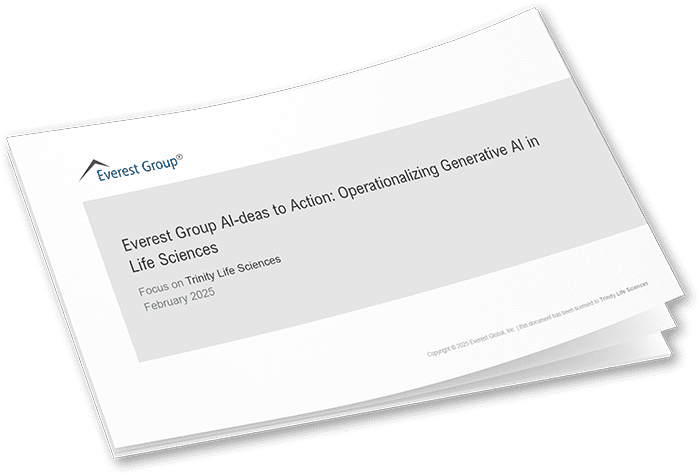Operationalizing Generative AI in Life Sciences—Trinity Life Sciences Included in Everest Group Report

The transformative potential of generative AI (GenAI) within the life sciences industry is highlighted in Everest Group’s report, “AI-deas to Action: Operationalizing Generative AI in Life Sciences.”
Fifteen companies were selected for inclusion across three categories:
- Broad-based IT/Business Process Organizations (BPOs)
- Clinical Research Organizations (CROs)
- Life Sciences Specialists
To be included in the report, providers had to have been profiled in past Everest Group PEAK Matrix® assessments with a Harvey score of above five in Innovation and Investment, as well as “good” top of mind awareness from the enterprise community in Everest Group’s conversations.
Trinity Life Sciences is profiled in the report as a life sciences specialist in the “Fast‑followers” section.
Trinity Life Sciences’ generative AI strategy blends foundational AI models with deep life sciences expertise, focusing on high-quality data, targeted functional optimization, and an expert-driven feedback loop. Through a value chain segment-based approach, particularly rooted in the sales and marketing segment, the company is working to drive meaningful AI adoption.”
—Aastha Malik, Practice Director at Everest Group
Why Is GenAI Impacting Life Sciences?
As defined by Everest Group in the assessment, GenAI is an advanced technology that produces new content by recognizing patterns in existing data.
It can emulate human creativity, boost productivity and foster innovation while opening up new opportunities and solutions. GenAI has the potential to greatly impact the life sciences industry by automating data-intensive tasks and accelerating complex research processes. Trinity’s GenAI approach aims to drive efficiency, speed and collaborative synergy between GenAI technology and human expertise.
Trinity’s GenAI Strategy and Focus
Trinity’s GenAI strategy leverages leading foundational AI models and technologies while embedding life sciences-specific expertise and context. The approach focuses on three main pillars:
- ensuring high-quality, domain-specific data;
- optimizing GenAI use for specific life sciences functions through expert-driven feedback loops;
- and delivering GenAI capabilities within broader business solutions, enhancing existing products rather than creating standalone tools.
Generative AI Use Cases
The report highlights several of Trinity’s key life sciences operations use cases for GenAI, including:
- Brand Insights AI: An AI-enabled insights hub with interactive chat that connects to a pre-integrated market research ecosystem, uncovering new insights from proprietary interviews, reports and unstructured/textual data.
- Medical Affairs Insights AI: A platform that allows various medical affairs user personas to query against an uploaded, approved knowledgebase or upload their own customized notes/documents.
- BI Tool Configuration: Implementation services of GenAI capabilities within top BI systems such as Tableau and ThoughtSpot, including configuration of life sciences-specific layers and field/metric synonyms.
- Field Insights AI: A chat-based application to assess activity and performance statistics for analysts, home office users and representatives.
- Terra – GenAI Module: Part of Trinity Terra’s data catalog module, answering questions related to the catalog dataset using the catalog data and external sources.
Interested in GenAI?
GenAI experts across Trinity have created a library of thought leadership to explain, predict, illuminate and clarify. Here are a couple of highlights:
- On-demand Webinar
Cracking the Code on Generative AI: From Hype to Impact - Case Study
Improving Data Operations Efficiency through GenAI-Powered Process Automation
Questions? We’re here to answer them. Contact us.
